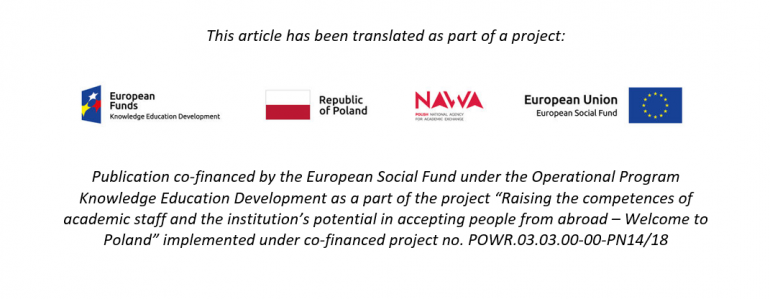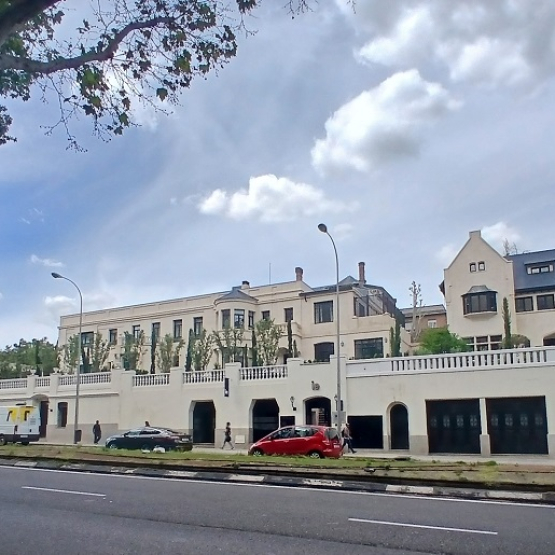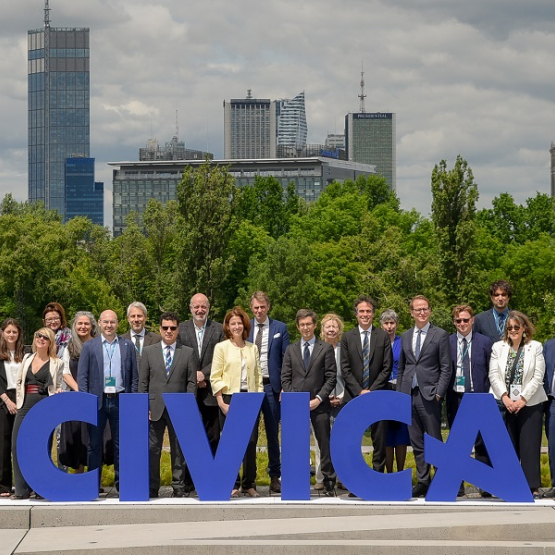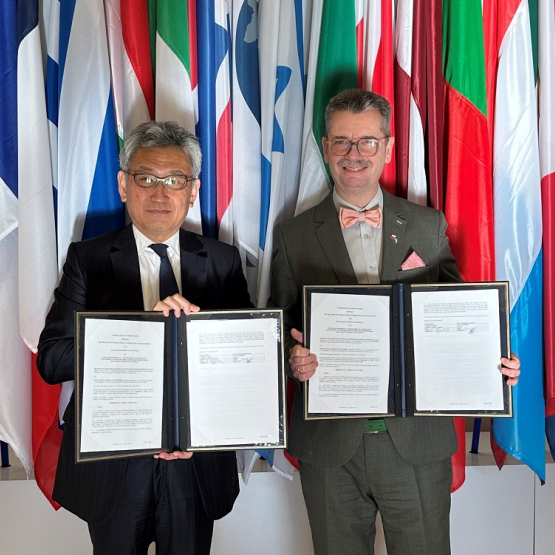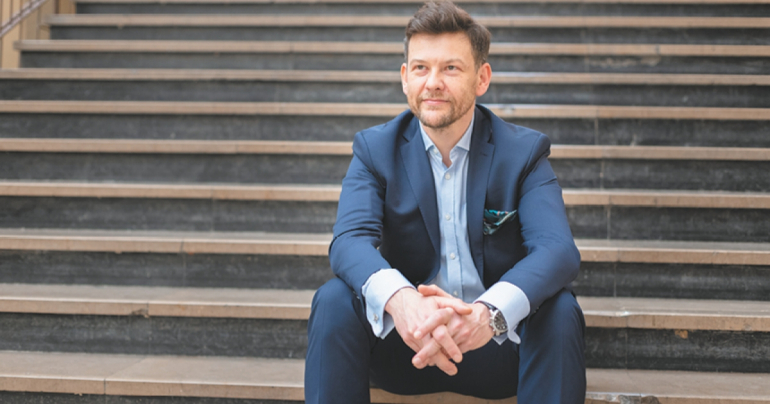
AN INTERVIEW WITH PROFESSOR SGH MARCINEM WOJTYSIAK-KOTLARSKIM, AACSB AND EQUIS ACCREDITATION PROJECT MANAGER
Why does our university need accreditations? Is it a whim or a way to raise prestige?
It's definitely about prestige. Generally speaking, accreditations are based on the fact that universities (in our case: economic university) undergo external evaluation of accrediting institutions, which independently assess their operation on the basis of many criteria. Accreditation institutions that operate in the world enjoy bigger or smaller prestige. It is worth trying to obtain the most important accreditations. When a university exposes itself to external evaluation, it does so consciously and voluntarily, as SGH does in the case of AACSB and EQUIS, because it wants to juxtapose its functioning with best practices. In this sense, the entire accreditation process and as a result of it, accreditation should be perceived as a chance for the university because its functioning may be improved this way.
And is such university as SGH not satisfied with a good opinion, high places in rankings, a very good position of our graduates on the labour market?
Accreditations are highly valid. The situation of SGH is special: we have a very good position on the domestic market and even more broadly: regional, in the area of Central and Eastern Europe. We are a leader here. However, nowadays, competition on the education market gains a global dimension. We have to compare ourselves with the best in the whole world. The best international accreditations give us such an opportunity, for example, to be better perceived by potential students or professors who want to work with us. It turns out that foreign students consider the most important foreign accreditations as one of the key criteria for choosing a university. It frequently results from the fact that students are advised by parents who are sometimes more aware than their teenage children in this regard.
Which of the existing accreditations concerning economic universities are most highly valued on the market? Which of them are already possessed by SGH and which are we still fighting for?
Making some simplification, it can be said that at present our university has two important international accreditations for business schools. It is AMBA accreditation, which applies to MBA studies, and CEEMAN accreditation. The latter is an accreditation for business schools from Central and Eastern Europe. However, two key accreditations in the world that we still lack are EQUIS and AACSB. The world's best business schools often aspire to obtain the so-called triple accreditation crown, which is formed by AMBA, EQUIS and AACSB. If we get two accreditations that are still missing from the triple crown, we will enter the elite, constituted by less than a hundred universities in the world having them. This is an important distinguishing feature on the international global market of educational services. So we are fighting to enter the world league!
Peter Drucker, a famous professor of management sciences saw competition as a comparison with the best in the world. I think that this is how we should perceive the perspective for SGH's development strategy today. Of course, we're proud of our position in the region and I'm not saying that achieving world-class excellence is an easy process but in my opinion this is the only right way. And that's why we are inspired by the most important international accreditations. Bearing in mind that accreditations do distinguish schools that belong to the elite, the school authorities have decided that we will strive for a triple crown.
We have a chance to think about the future of the university in a bold, creative and innovative way owing to accreditations. I think that is worth taking advantage of the chance and it is worth doing together with the entire academic community.
Do the accreditations we lack for the triple accreditation crown display any specific features?
At the university, I am responsible for conducting two accreditation projects that aim at obtaining AACSB and EQUIS accreditations. It should be mentioned at the beginning that we have successfully tried to co-finance these two accreditation projects from the funds of the Ministry of Science and Higher Education. This is important because it makes it easier for us to finance the indicated projects, and foreign accreditation costs a lot. Ministerial funds were allocated to fees related to accreditation processes that we are required to pay.
EQUIS and AACSB are similar accreditations because they relate to all key aspects of university functioning and as widely as possible allow us as a university to confront best practices - starting with the issues related to the strategy and management processes at the university through processes connected with shaping the didactic offer, and then ensuring how learning outcomes are achieved through the area related to human resources management, as well as, for example, an extremely important area regarding the internationalisation of university. So they are comprehensive institutional accreditations.
It is worth adding that while historically speaking, AACSB is an American accreditation and EQUIS is European, nowadays there is a process of unification of the indicated organisations in the sense that EQUIS aims at winning markets and give accreditations to universities also outside Europe and by analogy - AACSB opens up to markets outside America. In this sense, these are key organisations that become increasingly competitive with each other on a global scale.
What is the course of the accreditation process?
The process of obtaining accreditation (so-called initial accreditation) takes several years, while obtaining them does not end the university's effort related to accreditation, because then the so-called continuous improvement period begins, i.e. in fact we are constantly working on maintaining and improving the SGH accreditation. Thus, when deciding to apply for key accreditations, the school assumes certain obligations that are long-term. But it makes sense because we work with the world's best accrediting institutions. It is also important that accreditation institutions animate the functioning of a valuable academic community around them.
Cooperating with authorities and professors of the most famous business schools opens up new perspectives and gives inspiration. Let me give you one example in this context. Namely, I took part in the most important annual AACSB conference, i.e. the International Conference & Annual Meeting, which was held in Honolulu last year, where I talked for a long time to the dean of the London Business School, professor Francois Ortalo-Magne. After his inspiring keynote speech he developed the thought that business schools, while thinking about the future, have to escape from the ‘bad – good’ dichotomy. He regarded it as a trap. It is not enough to be good. One has to strive for greatness. These are examples of attitudes that we can share being involved in the work within the network of the best schools in the world.
Is there any sense to apply for three accreditations if they are so similar? Is there any substantive reason or does it mean that it finds more applicability in American and European markets?
Accreditations are similar in scope but they differ. At this point, it is worth making a reference to the standards of each of the indicated accreditations, the standards with which the institution applying for accreditation is familiar and ensures compliance with them in performing its activities. And so: in AACSB we deal with 15 standards and in EQUIS with 10, and they are a little different. For example, in the EQUIS accreditation we will find an explicite standard on internationalisation. There are also some differences regarding the specifics of cooperation between the accrediting institution and the university, which means that we learn a bit different things. One way or another, it should be noted that in the world the triple-crown accreditation is assessed as an extremely important achievement of a business school/university of economics. Despite some similarities in the accreditation of AACSB and EQUIS, we want to obtain both of them and, consequently, to obtain a triple crown; this is important in the context of the strategic goals of SGH.
Who are the experts assessing us during the accreditation processes? What is the subject of the examination of the accreditation commission?
We are dealing with various people who support us in obtaining accreditation at its various stages in the course of the accreditation procedure. For example, in AACSB accreditation we have a mentor who provides us with his knowledge and experience and wants to help us get this accreditation. Our mentor is Ian Clarke, who is a professor of strategy at the University of Edinburgh, Scotland, but previously held many managerial positions in business schools. He is also an experienced manager dealing with higher education. The mentor is suggested by an accrediting institution, it is practically always a dormitory with extensive experience in performing numerous managerial functions in business schools.
Are we dealing only with dormitories due to the fact that we discuss business schools, universities with economic fields of study, or are there any business representatives in accreditation committees?
The role of a mentor is the first example where someone talks to us a lot, analyses the current situation of the university, assesses us a bit, but above all helps. However, the main confrontation with the accrediting institution is the visit of the evaluation committee. It is often referred to as a peer review visit. The point is that the members of the visiting committee are representatives of other institutions that are already accredited, for example the dean of a business school that is already on the AACSB network. This is an academic assessment. However, it is worth adding that both AACSB and EQUIS are open to cooperation with corporate partners, as it is impossible to define, modify and implement the best practices regarding the functioning of business schools without taking a break from practice. Of course, SGH has been aware of this for many years, for example, we work with a group of SGH partners, and we try to watch their application nature in research and so on.
It can therefore be summarised that the indicated persons display vast knowledge, experience and awareness of what the best practices regarding the functioning of business schools are.
Who is interested or who should be interested in accreditations? What are accreditation recipients?
I am very happy to hear this question, in my opinion it is one of the most important question in our conversation but also in everyday work of the university. In general, if we are talking about SGH, it has many stakeholders. I will mention a few examples: accreditation should interest students just because juxtaposing business schools with the best practices of the best accrediting institutions is aimed at improving the way in which the university functions. It is targeted at providing students with a better didactic offer, ensuring that better and better educational methods are used, that the knowledge of practitioners is more widely applied, that the potential remuneration of graduates on the labour market is better, that the school is involved with the work with graduates on a broader scale.
Another extremely important area of affairs concerns the way in which accreditations affect the improvement of the area concerning human resources management. Accreditations very clearly focus on ensuring the development of the staff (both scientific and didactic staff as well as administration) in this field, on ensuring that the staff is internationalised, properly remunerated, that the duties of the staff are properly defined and so on. These are extremely important issues. One can mention numerous benefits provided by accreditations, and de facto all business school stakeholders should be interested in supporting accreditation processes.
To what extent is the accreditation process supportive as regards the changes currently taking place at SGH, such as creating a new statute, adapting the institution to new functioning under the new act on higher education? To what extent can all this be convergent? Can the preparation for accreditation be used to implement qualitative changes that may occur at our university?
These are fundamental issues. To be honest, two approaches are possible in principle. First of all, the implementation of accreditation can be tackled in such a way as to be simply oriented at getting it. I would call it a passive approach. However, in my opinion it is important to apply accreditation projects to significant qualitative changes when it comes to the functioning of a university. The philosophy of either doing what we have to do to obtain accreditation can be adopted, or we can be inspired by cooperation with accreditation institutions to think about the future of the university in a sensible and interesting way. My intention as a person managing accreditation projects is to use the latter approach. Indeed, the context of accreditation projects is the amendment to the Act on Higher Education and the university must adapt to the indicated changes. It is a challenge for us in the sense that there are different views on the aforementioned issue.
Additionally, accreditation gives an opportunity to identify the areas and processes that need improvement at the university. We are in an interesting moment because - as we know – SGH has recently adopted a new mission and guidelines for a development strategy. The external environment forces us to make profound changes. We must be ready now to make a major leap forward.
What opportunities do key international accreditations create?
It is undoubtedly a great opportunity for SGH. We can achieve a lot if we approach thinking about the future of school in a creative, innovative way and certainly with common sense. At present, the work is underway to finalise the strategic goals of the school. There is a resolution of the Senate enforced in May last year in which we adopted the school's mission, as well as guidelines for the school's vision and strategy. However, it still requires to be clarified. Let me use a certain metaphor for the needs of our conversation: one of the most famous articles in the ‘Harvard Business Review’ on strategy is an article presenting the ways in which organisations should create their visions. By definition, a vision is a target illustration of how an organisation will function, often formulated over a horizon of several years. As an academic community, we are currently asking ourselves the following question: how would we like SGH to look like in 15-20 years’ time? The article exploits the metaphor: let's imagine that we plan to conquer Mount Everest next year. Just you and me. As we hear it, we can have great doubts at first whether we are able to achieve it. It is not an easy task, the goal is very ambitious. But if we start training intensively today, if we frequently visit a fitness club and improve the functioning of our bodies, then if we go to Mount Everest next year, we may not reach this summit, but we may get as far as the I and II or even III camps and not just the base below the summit.
What am I aiming at? Accreditations provide us with a chance for a bold, creative, innovative thinking about the future of the university. I think this is one of the biggest opportunities worth taking advantage of and it is worth doing together with the entire academic community. I often talk to colleagues at SGH Warsaw School of Economics, both with researchers-educators as well as with administrative workers, telling them about the stage of accreditation projects. In practice, I cooperate with all university units. I cordially invite everyone to cooperation. Strength is in collective action, in the participatory nature of change. We always try to keep this in mind while implementing accreditation projects. It is worth getting involved in accreditation projects, because together we can consider the future of the school and recommend activities, being inspired by the practices of the best universities in the world.
What awaits us in the near future when it comes to these two accreditations?
We are more or less at the same stage in both accreditation projects, both are in an advanced stage: we have obtained eligibility, i.e. the so-called admission to the main part of the accreditation process, and we cooperate with a mentor in the case of AACSB accreditation and with an advisor in the case of EQUIS accreditation. We are preparing self-assessment reports. We are in the process of agreeing upon the dates of visits of the accreditation commissions, they will probably take place in the first half of 2020. Then, decisions will be made for both accreditations on whether to grant accreditation to the university. This is an important moment, which is why, as an academic community, we should make an effort to prepare well for the indicated visits, both when it comes to improving the functioning of the university in the sense that it is to be in line with the AACSB and EQUIS standards, and in relation to certain documents that we will prepare for the needs of the aforementioned visits. In addition, we have to ensure that our university lives and breathes accreditations so that accreditation committees have no doubt that SGH deserves the accreditations. We focus on the effective, meaningful implementation of accreditation standards in everyday life of the university. It has to be done wisely.

